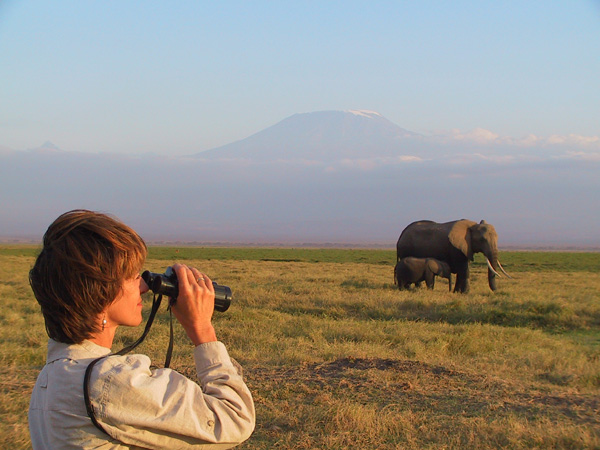

|
 |
As a child in Kenya, Joyce Poole developed a love of elephants. Now she is in China, campaigning against their slaughter. Li Aoxue reports.
Joyce Poole has been a lifelong campaigner against the ivory trade and the killing of elephants that goes with it. Her fascination with the animal began at age 6, when her father moved the family from the United States to Kenya, and quickly grew when as a teenager she began to study their behavior.
Protecting elephants has been a passion for Poole and eventually drew her to Hong Kong in 1989 as part of a worldwide campaign against the ivory trade.
Now she is back in China, this time on the mainland, which has become the largest market in the world for ivory.
"China started to become the main consumer when they were allowed to buy ivory in 2007, and the situation has become worse, especially in recent years," Poole says.
She believes part of the problem is a lack of understanding about the process of collecting ivory and that it involves killing the elephant.
"Most people don't know that to make an ivory product, people need to cut the trunk from an elephant, and it is a cruel thing as that it is going to take the elephant's life," she says.
The good thing is that many Chinese have joined the fight against the ivory trade, and celebrities such as Jackie Chen have taken up the cause of animal welfare, she says.
Some day, she says, elephants could become an extinct species.
"When I think about elephants being killed and that there is nothing we can do about it, I just cannot sleep well at night," she says.
Poole's family moved to Kenya when her father became the local director of the Peace Corps there.
"I did my schooling in Kenya, and when I didn't have class, my family and I would camp in national parks and go on safari in Africa. It was a lot of fun for me." Poole says.
When she turned 19, she delayed plans to attend university in the US to spend a year studying elephant behavior in Kenya.
"Elephants attracted me because they are very intelligent and social, and to some extent they are quite similar to human beings as they live in a family and have long-lasting relationships. They can also be very caring and quite dependable toward their family members," Poole says.
"They are clever enough to know who is dangerous," she says. "When they encounter poachers, they will run away, and if they encounter people like me, they are not defensive but friendly."
Conflict in parts of Africa has left elephants there particularly vulnerable and close to being wiped out in areas, Poole says.
"Elephants are considered the architects of forest as they open up new spaces, dig water for other animals, and maintain the forest dynamics," Poole says.
"Without them there will surely be an ecological imbalance."
Childhood camping trips and safaris gave Poole an appreciation of nature.
"I still remember camping with my family in the national parks. Walking from the dining room tent to the sleeping tent at night I could see stars above me and hear the sound of crickets and frogs. I just felt so connected to nature."
Poole is happy to see an increasing number of young Africans studying elephant protection, many of them inspired by her, she says.
She now spends half of her time in Norway and the other half in Kenya. Together with her husband she has launched a website (elephantvoices.org) on elephant protection that includes information on how they communicate through sounds and body language.
Poole says the website has about 18,000 Facebook followers and she plans to transfer some content to a Chinese microblog account for people in China.
"By reading our website, if people start to know that animals are capable of carrying empathy, that they can suffer; and they have thoughts and feelings, some of them may stop buying ivory products and think about the animals' future," Poole says.
The industrialization of farming has separated animals from people, and she believes this has led to worse treatment of them. Elephants are one of the animals paying the price for this, she says, not just through the ivory trade, but also through zoos, which target baby elephants.
"It is a cruel thing that they use helicopters to take baby elephants away from their families as mother elephants are very defensive," she says.
Poole's goal in China and beyond is simple: to protect elephants. "I would like my great-grand children to be able to see elephants and play with them and I hope elephants can be treated better than before."













